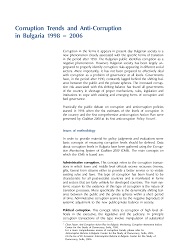Corruption Trends and Anti-Corruption in Bulgaria 1998 – 2006
Corruption Trends and Anti-Corruption in Bulgaria 1998 – 2006
Author(s): Author Not Specified
Subject(s): Politics / Political Sciences, Social Sciences, Economy, Law, Constitution, Jurisprudence, National Economy, Sociology, Applied Sociology, Economic development
Published by: Център за изследване на демокрацията
Summary/Abstract: This publication is devoted to the trends in corruption and anti-corruption policy during the period 1998-2006. Corruption in the forms it appears in present day Bulgarian society is a new phenomenon closely associated with the specific forms of transition in the period after 1990. The Bulgarian public identifies corruption as a negative phenomenon. However, Bulgarian society has been largely unprepared to properly identify corruption risks appearing in different social sectors. More importantly, it has not been prepared to effectively deal with corruption as a problem of governance at all levels. Governments have, in the period after 1990, constantly lagged behind the shifting balance between the public and the private spheres. The increased corruption risk associated with this shifting balance has found all governments of the country in shortage of proper mechanisms, rules, legislation and institutions to cope with existing and emerging forms of corruption and bad governance.
Series: CSD Corruption-Monitoring
- Page Count: 13
- Publication Year: 2006
- Language: English
- Content File-PDF
- Introduction

